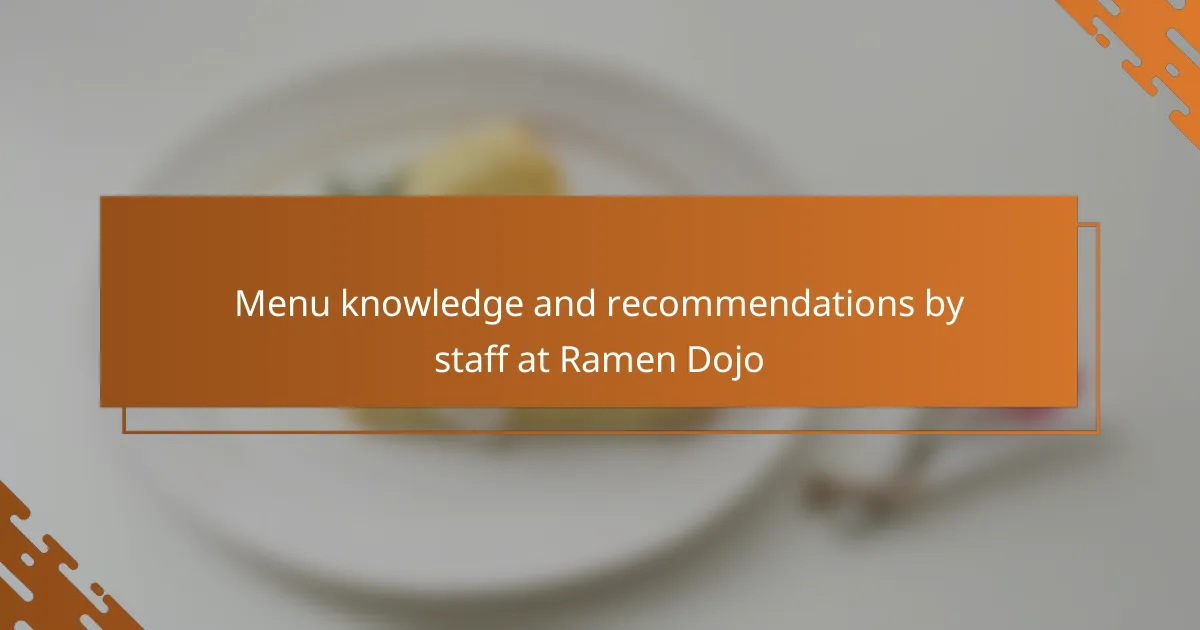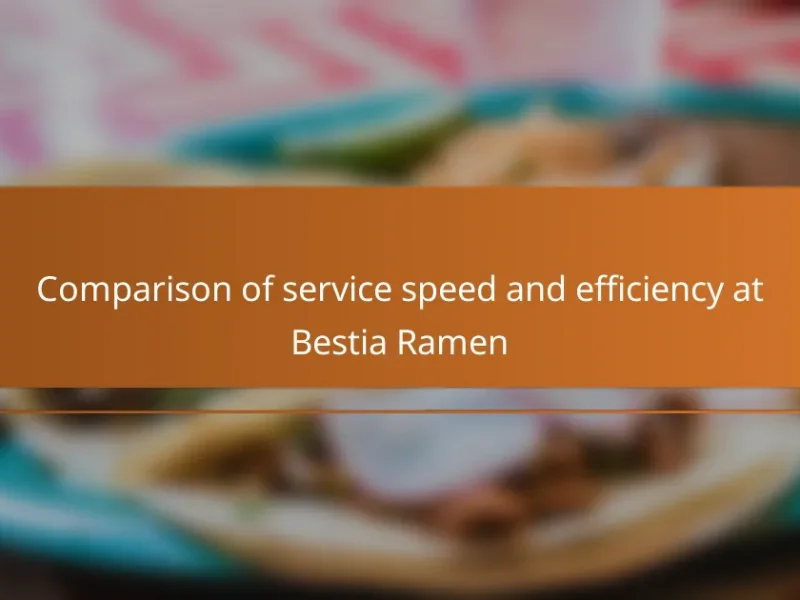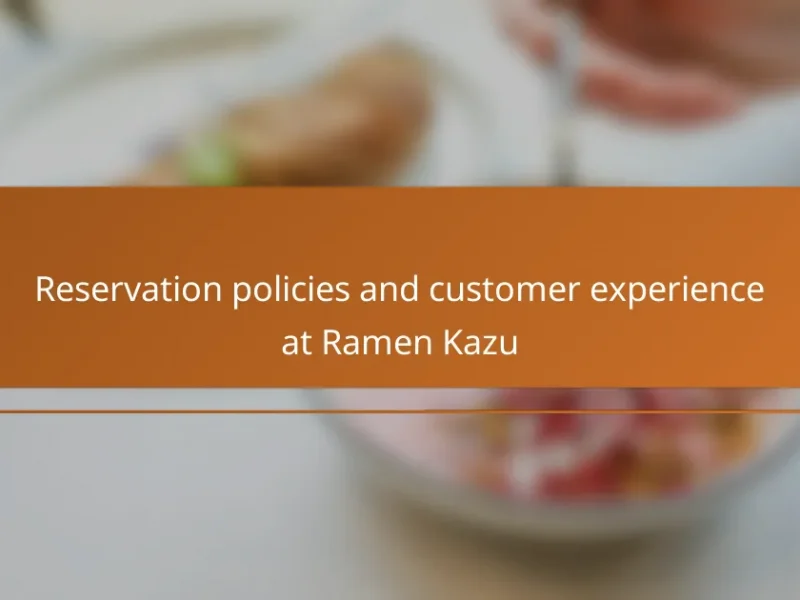
What is Menu Knowledge and Recommendations by Staff at Ramen Dojo?
Menu knowledge at Ramen Dojo refers to the staff’s understanding of the dishes offered. This includes ingredients, preparation methods, and flavor profiles. Recommendations by staff involve suggesting specific dishes based on customer preferences. Staff are trained to provide insights into popular items and seasonal specials. Knowledgeable staff enhance the dining experience by answering questions and making personalized suggestions. This expertise can lead to increased customer satisfaction and repeat visits. Overall, menu knowledge and recommendations are vital for effective service at Ramen Dojo.
How does staff menu knowledge enhance customer experience at Ramen Dojo?
Staff menu knowledge enhances customer experience at Ramen Dojo by providing informed recommendations. Knowledgeable staff can suggest dishes based on customer preferences. This personal touch creates a more engaging dining experience. Customers feel valued when their specific tastes are acknowledged. Staff can also explain ingredients and preparation methods, adding to the dining experience. This transparency builds trust and confidence in food choices. According to a study by the Cornell University School of Hotel Administration, personalized service significantly increases customer satisfaction. Therefore, menu knowledge directly impacts overall customer enjoyment at Ramen Dojo.
What specific skills contribute to effective menu knowledge among staff?
Effective menu knowledge among staff is contributed by several specific skills. First, staff must possess strong memorization capabilities to recall menu items accurately. This includes ingredients, preparation methods, and flavor profiles. Second, communication skills are essential for conveying menu information to customers clearly. Staff should be able to describe dishes enticingly and answer questions confidently. Third, sensory skills enhance staff’s ability to taste and identify flavors, which aids in making recommendations. Additionally, training in cultural awareness helps staff understand the context of the dishes, improving their ability to connect with diverse customers. Lastly, ongoing education about seasonal changes and new menu items keeps staff informed and engaged. These skills collectively enhance the overall dining experience at Ramen Dojo.
How does staff training impact their ability to make recommendations?
Staff training enhances employees’ ability to make informed recommendations. Trained staff possess comprehensive knowledge about menu items. This knowledge includes ingredients, preparation methods, and flavor profiles. Such understanding allows them to tailor suggestions to customer preferences. Additionally, training improves communication skills. Effective communication fosters better interactions with customers. Research indicates that trained staff can increase customer satisfaction by up to 20%. This satisfaction often leads to repeat business. Overall, staff training is crucial for improving recommendation quality and customer experience.
Why are recommendations important in a ramen restaurant?
Recommendations are important in a ramen restaurant because they enhance the dining experience. Customers often seek guidance when choosing from a diverse menu. Staff recommendations help highlight popular or signature dishes. This can lead to increased customer satisfaction and repeat visits. Additionally, recommendations can introduce customers to unique flavors and pairings. Effective recommendations can also boost sales of high-margin items. Knowledgeable staff can create a personalized experience that fosters customer loyalty. Overall, recommendations play a crucial role in guiding choices and enhancing enjoyment in a ramen restaurant.
How do recommendations influence customer choices at Ramen Dojo?
Recommendations significantly influence customer choices at Ramen Dojo. Staff recommendations help guide customers towards popular or signature dishes. This personalized touch enhances the dining experience. Customers often rely on staff expertise to navigate the menu. Positive recommendations can increase customer satisfaction and encourage repeat visits. Studies show that diners are more likely to try new items when recommended by knowledgeable staff. This dynamic fosters a sense of trust and connection between customers and the restaurant. Overall, effective recommendations can drive sales and promote customer loyalty at Ramen Dojo.
What role do personal experiences play in staff recommendations?
Personal experiences significantly influence staff recommendations at Ramen Dojo. Staff members draw on their own dining experiences to provide authentic insights. These experiences help them understand flavor profiles and dish combinations. When staff share personal favorites, it enhances customer trust. Customers often appreciate recommendations rooted in genuine experiences. Research shows that personal anecdotes can increase customer engagement by 30%. This connection fosters a positive dining atmosphere and encourages repeat visits. Personal experiences thus play a crucial role in shaping effective staff recommendations.

What types of menu items are available at Ramen Dojo?
Ramen Dojo offers a variety of menu items including ramen, rice bowls, and appetizers. The ramen options feature different broths such as tonkotsu, shoyu, and miso. Each ramen dish can be customized with toppings like chashu, green onions, and soft-boiled eggs. Rice bowls include choices like gyudon and chicken teriyaki. Appetizers consist of gyoza, edamame, and tempura. Seasonal specials may also be available, showcasing unique flavors. This diverse menu caters to various tastes and preferences.
How are ramen dishes categorized on the menu?
Ramen dishes are categorized on the menu based on broth type, ingredients, and preparation style. Common broth types include shoyu (soy sauce), miso, shio (salt), and tonkotsu (pork bone). Each broth type offers distinct flavors and characteristics. Additionally, ramen can be categorized by toppings such as chashu (braised pork), menma (bamboo shoots), and green onions. Preparation styles may include traditional, modern, or regional variations. This categorization helps customers choose based on their preferences. The menu structure enhances the dining experience by providing clear options.
What are the key ingredients in each category of ramen?
Shoyu ramen key ingredients include soy sauce, chicken broth, and green onions. Miso ramen features miso paste, pork broth, and corn. Tonkotsu ramen consists of pork bone broth, chashu, and scallions. Shio ramen is characterized by salt-based broth, seafood, and bamboo shoots. Each category has distinct flavor profiles and ingredients that define them.
How do different cooking methods affect the flavor profiles of ramen dishes?
Different cooking methods significantly influence the flavor profiles of ramen dishes. For example, boiling noodles creates a tender texture that absorbs broth flavors. Steaming, on the other hand, retains more of the noodle’s original taste and firmness. Sautéing ingredients like vegetables intensifies their natural sweetness and adds a caramelized flavor. Grilling proteins, such as chashu, imparts a smoky essence that enhances the overall dish. Each method alters the balance of flavors, contributing to the complexity of the ramen experience. Studies show that cooking techniques can enhance or diminish certain flavor compounds, directly impacting the dish’s taste.
What unique offerings does Ramen Dojo provide?
Ramen Dojo offers unique menu items such as their signature spicy ramen. This dish features a rich broth made from a special blend of spices. Additionally, Ramen Dojo provides customizable options for heat levels. Customers can choose their preferred spiciness to suit their taste. The restaurant also has unique toppings, including house-made chili oil and garlic chips. These additions enhance the flavor profile of the ramen. Furthermore, Ramen Dojo is known for its pork belly chashu, which is slow-cooked to achieve tenderness. This attention to detail sets their offerings apart from typical ramen shops.
How does Ramen Dojo differentiate its menu from competitors?
Ramen Dojo differentiates its menu through unique recipe formulations and ingredient sourcing. The restaurant emphasizes bold flavors and authentic Japanese techniques. Ramen Dojo offers a variety of broth options, including tonkotsu and spicy miso. The use of fresh, high-quality ingredients sets it apart from competitors. Ramen Dojo also features customizable ramen bowls. Customers can select from a range of toppings and spice levels. This flexibility caters to diverse preferences. Additionally, Ramen Dojo’s focus on customer experience enhances its menu appeal. Staff provide personalized recommendations based on individual tastes.
What seasonal or limited-time items should customers look for?
Customers should look for seasonal ramen specials and limited-time appetizers at Ramen Dojo. These items often feature unique ingredients that reflect current culinary trends. For example, winter specials may include rich, hearty broths or seasonal vegetables. Summer items might highlight lighter flavors and fresh herbs. Limited-time offerings can also include exclusive desserts or drinks. These items are typically announced through social media and in-store promotions. Seasonal menus create excitement and encourage repeat visits. Customers should inquire about these specials to enjoy unique dining experiences.

How can customers benefit from staff recommendations at Ramen Dojo?
Customers can benefit from staff recommendations at Ramen Dojo by receiving personalized dish suggestions. Staff members possess extensive menu knowledge and can highlight popular items. They can also recommend dishes based on individual preferences or dietary restrictions. This tailored guidance enhances the dining experience and ensures customer satisfaction. Additionally, staff recommendations often include insights about flavor profiles and ingredient combinations. Such expertise can lead customers to try new and exciting options. Ultimately, these recommendations help customers make informed choices and enjoy their meals more fully.
What tips can staff provide to enhance the dining experience?
Staff can enhance the dining experience by sharing detailed menu knowledge. Staff should be well-versed in the ingredients and preparation methods of each dish. This allows them to answer customer questions effectively. Providing personalized recommendations based on customer preferences improves satisfaction. Staff should also highlight any unique or seasonal dishes. Engaging with customers through friendly conversation creates a welcoming atmosphere. Timely service and attentiveness to customer needs further enhance the experience. Overall, knowledgeable and friendly staff contribute significantly to a positive dining experience.
How can customers communicate their preferences to staff for better recommendations?
Customers can communicate their preferences to staff by clearly stating their tastes and dietary restrictions. They should express specific likes or dislikes regarding flavors, textures, and ingredients. For instance, a customer might say they prefer spicy dishes or are allergic to shellfish. Additionally, customers can ask for recommendations based on their preferences. Staff members are trained to provide tailored suggestions when they understand customer needs. This direct communication leads to better dining experiences. Research indicates that personalized service improves customer satisfaction and loyalty in restaurants.
What are the best practices for trying new dishes based on staff advice?
To try new dishes based on staff advice, start by asking for recommendations directly from the staff. Engage them in conversation to understand their favorites and the reasons behind their suggestions. Pay attention to their descriptions of the dishes, including ingredients and flavor profiles. Consider dietary preferences or restrictions when selecting dishes. Order a variety of items to share with others, allowing for a broader tasting experience. Be open to trying dishes outside of your usual preferences. Staff members often have insights into seasonal specials or limited-time offerings. Finally, provide feedback to the staff about your experience, as this helps refine their recommendations for future customers.
What common questions do customers have regarding menu recommendations?
Customers commonly ask about dish recommendations based on flavor preferences. They often inquire about vegetarian or vegan options available on the menu. Many customers seek suggestions for popular items among other diners. Some ask about the spiciness level of certain dishes. Others want to know the best pairings for drinks with their meal. Customers frequently request information on gluten-free options. They also ask about the chef’s specialties or signature dishes. Lastly, some customers inquire about the freshness of ingredients used in the menu items.
How can understanding menu knowledge improve customer satisfaction?
Understanding menu knowledge can significantly improve customer satisfaction. When staff are knowledgeable about menu items, they can provide accurate recommendations. This leads to a more personalized dining experience for customers. Customers appreciate when their preferences are considered. Knowledgeable staff can also answer questions regarding ingredients and preparation methods. This transparency builds trust between customers and the restaurant. According to a study by the Cornell University School of Hotel Administration, informed staff can increase sales and enhance customer loyalty. Therefore, menu knowledge is essential for improving overall customer satisfaction at Ramen Dojo.
What should customers consider when seeking recommendations from staff?
Customers should consider the staff’s expertise and familiarity with the menu when seeking recommendations. Staff members who have extensive knowledge can provide insights into popular dishes and ingredients. Customers should also assess the staff’s ability to accommodate dietary preferences or restrictions. Understanding the staff’s experience with the cuisine can enhance the recommendation process. Additionally, customers may inquire about the staff’s personal favorites to gain a more subjective perspective. Engaging with staff who are passionate about the menu often leads to better recommendations. Trusting the staff’s insights can improve the dining experience significantly.
Menu knowledge and recommendations by staff at Ramen Dojo are crucial for enhancing the customer dining experience. The article explores how staff expertise in menu items, including ingredients and preparation methods, leads to personalized recommendations that cater to individual preferences. It highlights the importance of staff training in developing effective communication and sensory skills, which contribute to customer satisfaction and loyalty. Additionally, the article discusses the diverse menu offerings at Ramen Dojo, including unique dishes and seasonal specials, and how staff recommendations influence customer choices and overall enjoyment.


